- Home
- Joel C. Rosenberg
The Auschwitz Escape Page 5
The Auschwitz Escape Read online
Page 5
“The whole town,” he said, his voice quivering. “They’ve all gone mad. They’ve burned down the synagogue. They’re attacking the shops, the ones owned by Jews. They’re beating anyone they can find, anyone who is a Jew. And now I have to show you. You must come. I carried her from the street, where they left her . . .” His voice trailed off.
“What?” Avi asked. “What is it?”
But Herr Mueller would not—or could not—speak anymore. Trembling, he took Avi and Jacob by the arms. He led them through the darkened front room of the bakery, past all its cases of pastries, pies, cakes, and strudels. They passed through the darkened kitchen, all its surfaces covered with a fine dust of flour and yeast. Into the back room, a storeroom of sorts. When they arrived, Herr Mueller took a small flashlight from his pocket and turned back to them one last time, then switched the flashlight on and pointed it at the crumpled body of a little girl, no older than ten.
Jacob gasped, his right hand involuntarily covering his mouth as he staggered backward. Avi gasped as well but took two steps forward, trying to get a better look.
“What happened?” Avi asked, his voice quavering.
The baker said nothing.
“Is she dead?” Avi asked.
Herr Mueller nodded.
“Are you sure?” Avi pressed, though for the moment he seemed paralyzed, unable to reach down and check for himself.
Jacob, too, was stiff as a board, unable to move, unable to react at all. But he did not have to ask who the girl was. Though she was lying facedown on the dirty tiled floor, a pool of blood around her, he already knew. He knew this pale-blue dress, trimmed with white lace. He recognized it, even torn and covered in blood. He knew these black patent-leather shoes. Jacob could not see her face, but he didn’t need to see it. Indeed, he didn’t want to see it. He knew immediately who it was. This was the dress Herr Berger had made for a discount. These were the shoes that Frau Bloom had special-ordered from Munich. He recognized the gold bracelet on the girl’s right wrist as the one Mama had given her on her ninth birthday.
Avi finally leaned down and carefully rolled the little girl over.
Instinctively, Jacob covered his eyes and looked away. But finally he looked back and winced. There was no mistaking the bitter truth.
This was his sister, Ruth.
10
Ruth’s eyes were frozen open in a frightful, glassy stare.
Jacob suddenly became extremely ill. He turned away and vomited. His vision began to blur. His head began to spin. His eyes filled with tears. He was about to cry out in anguish, but Herr Mueller saw him and grabbed him and covered his mouth.
“No, my son!” he whispered. “You mustn’t cry. Not here. It’s too dangerous. Go to your family. Tell them what happened and get them to safety.”
Then he turned to Avi. “When the madness ends, I will bring her body, washed and wrapped in linens. We will make for her a proper burial, I assure you. But for now you both must go. You don’t have much time.”
Avi hesitated, but only for a moment. There was nothing they could do for Ruthie now, and Herr Mueller was right. They had to move before the mob turned on them. He ordered Jacob to follow him and then broke into a sprint, back to the car, with Jacob close on his heels.
As shops and houses went up in flames, as the wrenching cries of Jewish mothers and fathers rose into the night, they both jumped into the Adler. Avi gunned the engine and sped down the shadowy streets of Siegen faster than Jacob had ever seen him drive. He said nothing on the journey. His face showed no emotion. Not anger. Not grief. Not confusion or fear. Shock, perhaps, but Jacob was in no position to assess his uncle’s reaction properly, for he was in shock as well.
Finally they pulled onto Rubensstrasse and parked in front of number twenty-three, the three-story walk-up Avi had purchased before the Weltkrieg, what the rest of Europe was calling the Great War. It was a simple but sturdy house; Jacob’s family had rented it from Avi for nearly five years. But as Jacob forced himself to open the car door and stepped out onto the cold sidewalk and made himself walk up the stone steps, he knew in his heart and his soul that their lives would never be the same.
Jacob opened the front door and immediately saw the anxiety in his parents’ eyes. They rushed to him, but he could not make out what they were saying. Though they were standing right before him, it was as if their voices were miles away. He perceived they were asking something, but he didn’t know what. He tried to focus, tried to concentrate on the sounds or at least the movement of their lips. But he couldn’t. His father was pleading with him to talk. His mother was shaking with fright. They were demanding something from him. But it was all murky and indistinct. It was as if a fog had descended upon the room. Jacob couldn’t hear, couldn’t think, couldn’t reason, couldn’t speak—that is, until he heard Avi speak up behind him.
“I’m so sorry, but Ruthie is dead,” Avi said.
Then Jacob watched as his mother collapsed to the floor and let out a shriek. It was loud and shrill and piercing and could, Jacob was certain, be heard for blocks. Jacob had never heard a human being make such a sound. It was an unnatural, grief-stricken wail—utterly pained, lost, and devoid of hope.
11
After two days, the violence ended, and the fires were extinguished.
Some sense of order began to be restored, though every Jewish family was deeply shaken and fearful of what might happen next. For the next seven days, the Weisz family sat shivah. They mourned and wept and tried to make sense of their loss.
Hans Meyer and his family from the other end of the street stopped by one day to sit with them. Another time the Silvers from around the corner, including Naomi and her sisters, came. Jacob was grateful for their thoughtfulness, but he could not make eye contact with Naomi. He was stricken with grief, unable to process what had just happened, much less able to articulate how he was feeling about it.
Few spoke more than simple condolences. Jacob just looked down at the floor and nodded when spoken to. What was there to say? Still, when the rare visitor came with hard news, Jacob found himself determined to eavesdrop on the conversations of his father and his friends—and Uncle Avi, during his occasional visits. He had hoped that the horror they had endured in Siegen was somehow an isolated incident. What he found, however, was just the opposite.
One businessman who came to see Dr. Weisz from Vienna told them the anti-Jewish rampages had occurred all throughout Germany, Austria, and Czechoslovakia. What’s more, it seemed as if they had all been coordinated. The man from Vienna said he’d heard that at least ninety Jews had been murdered. Then Father told him that their Ruth had been murdered that night, though they still weren’t certain how it had come about exactly.
“Ninety-one, then,” the man said softly, respectfully. “I did not know. I am very sorry. I will tell the others. She will not be forgotten.”
A few days later, a friend of Jacob’s father came through town from Dresden, bringing even more ominous news.
“Have you heard what Frick has done?” the man asked.
“Minister Frick?” Jacob’s father asked. Jacob knew he was referring to Wilhelm Frick, the German interior minister.
“Who else?”
“No, we’ve heard nothing.”
“With Herr Hitler’s consent, he just passed a new ordinance,” the man said. “It’s a law called the Regulations against Jews’ Possession of Weapons. Effective immediately, no Jew in Germany has the right to own, possess, or carry a gun. All weapons and ammunition in the possession of Jews must be turned over forthwith. Any Jews caught with a handgun or rifle will be imprisoned and fined.”
“And?” Dr. Weisz asked. “I’m no sportsman. Are you?”
“No, I’m not,” the man from Dresden said. “But don’t you see? These attacks on our communities are just the beginning. Now Hitler is disarming us, and when we are completely defenseless, he will come for us, for all of us. Mark my words.”
Jacob was frightened. He wish
ed Uncle Avi were there. He would understand. But it was clear that his father did not see the seriousness of the threat, even after Ruth’s death. Dr. Weisz grieved over his daughter, to be sure, but he absolutely refused to believe it represented the policy of the Third Reich.
Jacob found himself deeply troubled by the news but even more so by the realization that his father still seemed so unwilling to face up to the dangers Hitler posed to the Jewish people—not just in Germany but throughout Europe. He still seemed to think this was a brief anomaly, not the beginning of a far greater evil.
Toward the end of December, a rabbi from Berlin, a dear friend of Dr. Weisz from his days at the university, came through town and stopped for a very brief visit. He said guardedly that a new word was being used in private Jewish circles in Berlin to describe the attacks on the Jews on November 9 and 10—Kristallnacht, the Night of Broken Glass. The rabbi said Siegen’s synagogue hadn’t been the only one burned to the ground. A total of some 265 synagogues had been burned, and an estimated 7,500 Jewish businesses had been ransacked.
“Der Führer even ordered his Brownshirts to desecrate Jewish cemeteries all over the country,” the rabbi said. “You should pack up your things and take your family out of Germany before it’s too late.”
Dr. Weisz was aghast at the notion of leaving the Fatherland, and he remonstrated with his friend for even proposing such an objectionable notion. “The Weisz family are good Germans,” he insisted. “We will never leave our home. You should be ashamed of yourself for even suggesting such a thing.”
The rabbi argued with him at length. He said he and his family were leaving for England within days. He was urging every Jew he could find to get out before the end of the month.
Jacob found the man’s arguments compelling, but as usual he kept his thoughts to himself, and the rabbi left as quickly as he’d come.
Day by day Jacob was becoming more frightened. But his father seemed to be in a state of denial. Rather than read the news or discuss it, he instead began to read novels, retreating into a fictional world for hours and days on end.
Then the most troubling news—at least to Jacob—came to their home.
This time it came not from friends and neighbors but from Uncle Avi. He said he’d heard that upward of thirty thousand Jewish men had been arrested by the Gestapo and the SS.
Jacob blanched when he heard the number. But his father seemed to believe neither the number nor the source. “Arrested? Arrested for what?”
“For being Jews—what else?” Avi said.
“Thirty thousand? That’s ridiculous.”
“It’s a fact, Reuben.”
“Says who?”
“I heard it from one of my suppliers, a goy from Wiesbaden,” Avi replied. “His son is high up in the Gestapo. Tells him everything. The man was practically bragging about it.”
“Why would he tell you?” Dr. Weisz asked.
“He doesn’t know I’m a Jew,” Avi said.
“How’s that possible?”
“He thinks I’m Catholic. Remember the crucifix I asked you to get me a few years back from your priest friend in Berlin?”
“Of course.”
“It’s hanging in my office in Cologne,” Avi said. “And I’ve never gone by Avraham Weisz there or in Lüdenscheid. There I’m Allen Dirksen.”
“And people believe you?”
“Why shouldn’t they believe me?”
“I’ve never heard anyone call you Allen Dirksen.”
“You’ve never come to Cologne or Lüdenscheid.”
“That’s because you keep me working like a slave in the factory here.”
“Now you know why I do that.”
“How much longer do you think you can keep that charade going?”
There was a long pause. “I don’t know,” Avi said finally. “But honestly, Reuben, that’s why I’ve come.”
Jacob had long before stopped slicing the carrot in his hand. His ear was pressed to the door between the kitchen and the living room, trying to catch every word, every syllable.
“What do you mean?” his father said.
Jacob heard Avi get up, followed by the sound of the shades being drawn. “I think we need to leave Germany.”
“Not this again. That’s ludicrous.”
“No, it’s not. We need to leave soon—now, before this gets any worse.”
The argument that ensued that night was as intense as any Jacob had ever heard between his father and uncle. At one point, it got so heated that Dr. Weisz ordered Jacob to go up to his room, a cozy little nook in the attic.
Jacob hadn’t been sent to his room without dinner since childhood. Defiant, he went only as far as the landing on the second floor, where the master bedroom and Ruthie’s bedroom were situated, along with a bath. There he sat crouched, perfectly still and quiet, straining to hear every word that was spoken.
“Don’t you see, Brother?” Avi pleaded. “They do not want us here. We are not safe.”
“Nonsense—we’re Germans,” Dr. Weisz shot back, fuming but careful not to let himself be heard by the neighbors. “Faithful, proud, loyal citizens of the Fatherland.”
“That’s not how Herr Hitler sees it.”
“His days are numbered.”
“They’re not,” Avi said. “His power is growing. He’s gained full control of the army. There are rumors he wants to seize Czechoslovakia and maybe all of Poland. He’s already grabbed the Rhineland and the Sudetenland. Who’s going to stop him now? The French? They had their chance. They blinked. The British? Chamberlain is clueless.”
“You underestimate Chamberlain, Avi.”
“Do I? Look at the mess he made in Munich.”
“What about Roosevelt?”
“What about him?” Avi replied. “Brother, please, you don’t really think the Americans are going to save the day, do you? They don’t see how evil Hitler is. One of their biggest magazines is making him a cover story, naming him Man of the Year. And besides, the Americans have their own troubles. Their economy is sputtering. Isolationism is rampant. You really think Roosevelt is focused on our problems? And even if he knows what we Jews are facing here, do you really think he’s going to lift a finger to help us?”
“You’re a fool, Avi!” Dr. Weisz replied. “What you’re saying is treasonous. I will not have you bring such poison into this house!”
Moments later, Jacob heard a door slam, and all was quiet.
But it was not over. It had only just begun.
12
JANUARY 1939
SIEGEN, GERMANY
As the new year began, Avi began coming to Siegen late on most Friday afternoons.
Often he would bring a basket of fresh fruit or vegetables or a new book from London or Paris that he’d bought on the black market, and then he would sit and chat at length with his brother.
“How is Sarah today?” Avi would ask, dutifully inquiring after his sister-in-law.
On that subject there wasn’t any good news to report. The death of little Ruth had plunged Jacob’s mother into a deep depression. Most of the time she refused to talk at all. For months now she had locked herself away in her bedroom, rarely willing to emerge even for meals.
As it was all too painful to discuss, Jacob’s father would turn the conversation to other things, and invariably the two brothers would find themselves arguing over politics. Jacob would always try to look and sound busy as he worked in the kitchen, preparing the Shabbat dinner. Yet as he peeled potatoes and diced onions, he listened carefully to all the men were saying in the other room. He was stunned by how rapidly it seemed the Reich was rushing toward another European war. He was sympathetic to his uncle’s argument that they should all leave Germany soon. And he was deeply dismayed that his father refused to see the handwriting on the wall and what it bespoke of the fate of Germany and its Jews.
“Reuben, have you ever heard of the Dachau camp?” Avi asked one night.
“No,” Jacob heard his father say
.
“Buchenwald?”
“No.”
“Sachsenhausen?” Avi pressed.
“No, why?”
“That’s where they’ve been sent, all of them.”
“Who?”
“The Jews.”
“What Jews?”
“The thirty thousand they arrested during Kristallnacht. They’ve been sent to work camps, except I hear they’re not just work camps. They’re slave-labor camps. Supposedly they’re building things for the military, so der Führer has everything he needs to take Germany into another disastrous war.”
“Don’t be ridiculous, Avi,” Dr. Weisz said. “This isn’t Egypt under the pharaohs.”
“Reuben, don’t you see what’s happening?” Avi asked. “Hitler is turning on the Jews. Haven’t you read Mein Kampf?”
“No; why should I?”
“Because everyone else in the country has.”
“It’s just political propaganda.”
“Maybe so, but Herr Hitler is pretty honest about what he thinks of us. You should read it, Reuben. Here, I’ve brought you a copy. Read it, and then promise me you’ll let me help you, Sarah, and Jacob get out of the country while we still can.”
“Don’t say such things, Avi. You’re going to get us all arrested.”
“Think about it, Reuben—look what’s happened in just the past few years. Don’t you see? They’re coming for us soon, Reuben. Kristallnacht? That was just the start of it.”
“Enough!” Dr. Weisz bellowed. “That is enough, Avi. How many times must I warn you? You are talking nonsense, and you will get us all killed. Now speak no more of such things, or get out of my house!”
At the end of January, Jacob’s father became very ill.
Out of nowhere, it seemed, he developed a hacking cough, a raging fever, and intense pain in his lungs. He couldn’t work. He couldn’t eat. He just stayed in bed, wheezing and groaning, so much so that Jacob’s mother moved into Ruthie’s old room so as not to catch whatever her husband had.

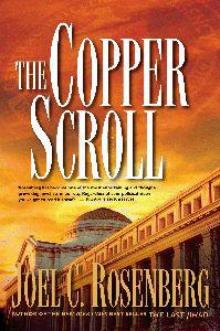 The Copper Scroll
The Copper Scroll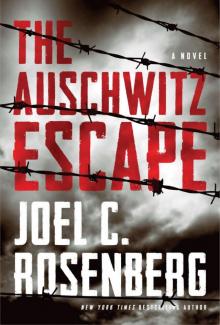 The Auschwitz Escape
The Auschwitz Escape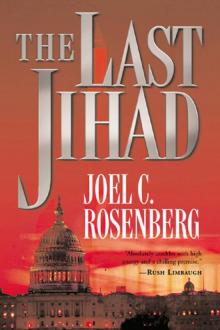 The Last Jihad
The Last Jihad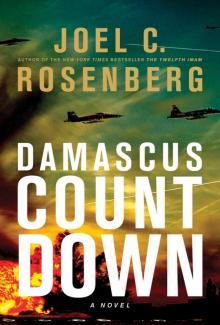 Damascus Countdown
Damascus Countdown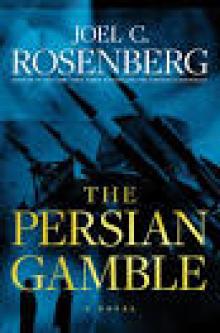 The Persian Gamble
The Persian Gamble The Jerusalem Assassin
The Jerusalem Assassin Dead Heat
Dead Heat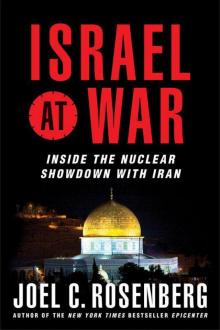 Israel at War: Inside the Nuclear Showdown With Iran
Israel at War: Inside the Nuclear Showdown With Iran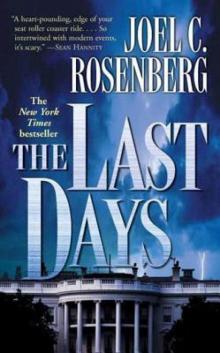 The Last Days
The Last Days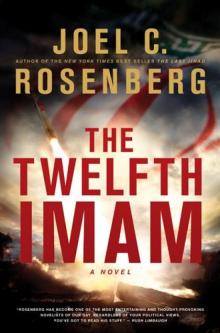 The Twelfth Imam
The Twelfth Imam Epicenter 2.0
Epicenter 2.0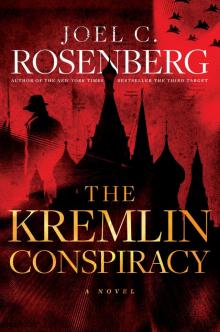 The Kremlin Conspiracy
The Kremlin Conspiracy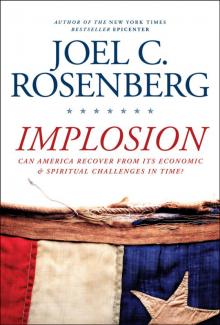 Implosion: Can America Recover From Its Economic and Spiritual Challenges in Time?
Implosion: Can America Recover From Its Economic and Spiritual Challenges in Time?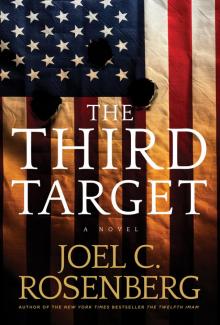 The Third Target: A J. B. Collins Novel
The Third Target: A J. B. Collins Novel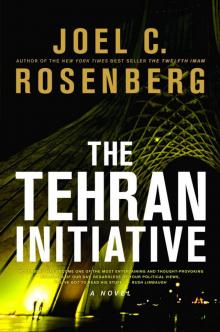 The Tehran Initiative
The Tehran Initiative Inside the Revolution
Inside the Revolution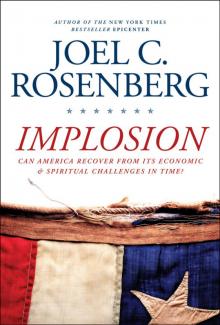 Implosion
Implosion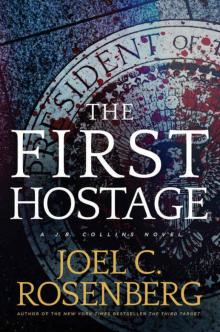 The First Hostage: A J. B. Collins Novel
The First Hostage: A J. B. Collins Novel